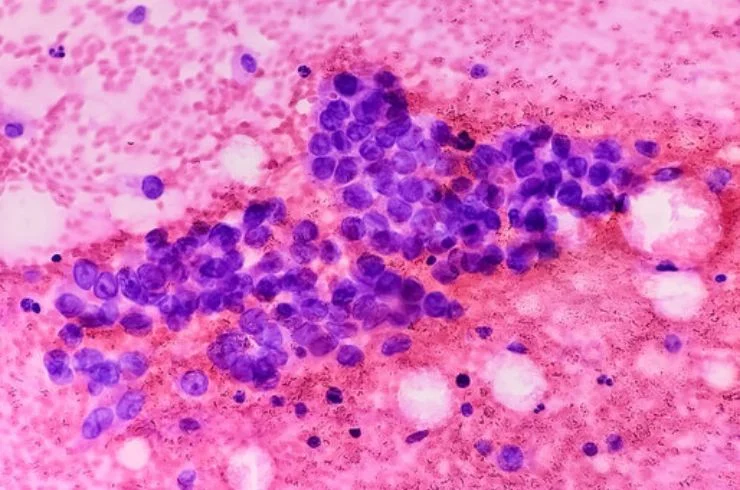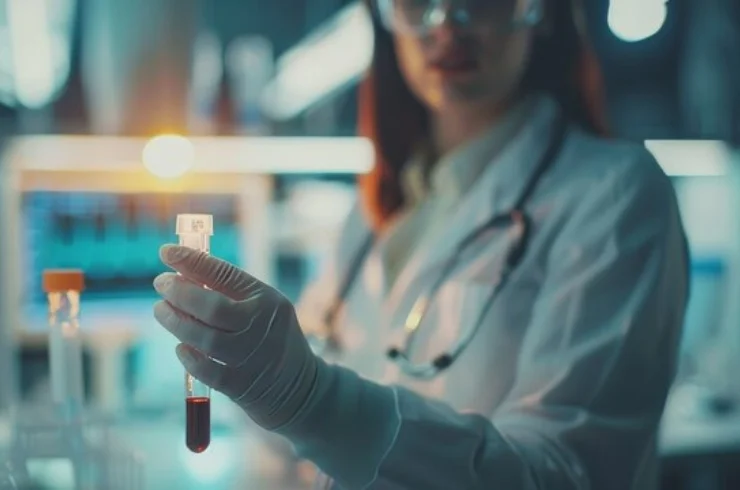
FNAC (Fine Needle Aspiration Cytology):
A minimally invasive procedure where cells are aspirated using a fine needle from swellings or masses (such as in the thyroid, breast, lymph nodes, or soft tissues). The aspirated material is then smeared on slides, stained, and examined under the microscope to detect infections, benign lesions, or malignancy.
Exfoliative Cytology:
This includes examination of naturally shed or collected cells, such as Pap smears (for cervical cancer screening) and fluid cytology (pleural, ascitic, or cerebrospinal fluids). These tests help in detecting early precancerous changes, infections, or metastatic diseases.
Pap Smear Reporting:
We follow the Bethesda System for reporting cervical smears, ensuring standardized interpretation of inflammatory, atypical, and neoplastic findings. Early detection through Pap smear helps in timely intervention for cervical cancer prevention.
Fluid Cytology:
Effusion fluids from pleural, peritoneal, or pericardial cavities are processed and examined for the presence of inflammatory cells, atypical cells, or malignancy. The findings assist clinicians in differentiating between infective, inflammatory, or cancer-related effusions.
Turnaround Time:
Cytopathology reports are usually issued within 24–48 hours, with urgent cases given priority to aid quick clinical decisions.
At Dr. A. Kumar’s Pathology, our Cytopathology service combines accuracy, speed, and compassion—delivering meaningful insights from cells to support timely and precise treatment plans.

Anemia Typing:
Anemia is classified based on red blood cell (RBC) indices and peripheral smear examination. This helps in identifying the type of anemia—microcytic, macrocytic, or normocytic. Once typed, additional investigations are recommended to determine the underlying cause such as nutritional deficiencies, chronic diseases, or bone marrow disorders.
Neonatal Sepsis Screen:
Neonatal blood samples are carefully examined for early signs of sepsis. Evaluation includes identification of immature white cells, toxic granulations, and calculation of Band cell percentage and the Immature/Total Neutrophil (I/T) Ratio. When nucleated red blood cells (nRBCs) are present in significant numbers, a corrected white blood cell (WBC) count is provided for accurate interpretation.
Critical Sample Reporting:
Samples showing critical values—Hemoglobin (Hb) less than 6 gm%, Total Leukocyte Count (TLC) less than 3000/mm³ or greater than 50,000/mm³, Platelet count less than 50,000/mm³, or presence of abnormal cells or blood parasites—are prioritized for urgent reporting. These cases are accompanied by a detailed peripheral smear examination to aid in quick and accurate clinical decisions.
Our Hematology department is committed to timely and precise evaluation, ensuring clinicians have the necessary insights for effective diagnosis and treatment.

Biopsy Examination:
Tissue samples from various organs are processed, sectioned, and stained for microscopic evaluation. Each biopsy is thoroughly examined to detect inflammation, benign changes, pre-cancerous lesions, or malignancies. Our focus is on providing clear, accurate, and clinically relevant diagnoses that guide further treatment.
Special Stains:
Where routine Hematoxylin and Eosin (H&E) staining is insufficient, additional special stains are used to highlight specific tissue elements such as connective tissue, microorganisms, or pigments. These stains help in the diagnosis of infections, liver diseases, tumors, and granulomatous conditions.
Turnaround Time:
Routine biopsy reports are issued within 3–5 working days. Urgent and small biopsy specimens are prioritized and may be reported sooner based on clinical requirement.
Internal & External Quality Assurance:
We follow strict internal quality control measures and participate in External Quality Assurance Schemes (EQAS) to ensure consistent accuracy and reliability in all histopathology reports.
Expert Review:
All slides are reviewed by a qualified pathologist with experience in diagnostic histopathology. Difficult or ambiguous cases are discussed further or referred for second opinion when needed, ensuring every patient receives the most accurate report possible.
At our center, Histopathology is more than diagnosis—it’s about providing the most detailed and informative analysis of tissue to support early detection, proper classification, and effective clinical management.

At BabyMoon, we believe that vaccination is a vital part of ensuring the health and well-being of children and the community. Our vaccination programs are designed to provide children with the necessary immunizations at appropriate ages, helping to prevent serious illnesses and promote a healthy start in life.
BabyMoon offers comprehensive vaccination programs, following national and international health guidelines. Here’s what you can expect:
We provide a clear and detailed immunization schedule that outlines the recommended vaccines for infants, children, and adolescents. Our healthcare professionals will guide you through each stage of your child’s vaccination journey.
Our qualified healthcare providers are available for consultations to address any questions or concerns you may have regarding vaccines, side effects, and their importance.
We conduct educational workshops and distribute informational materials that help parents understand the benefits of vaccination and the diseases that vaccines prevent.
To ensure timely vaccinations, we offer reminder systems that notify parents of upcoming vaccine appointments based on the immunization schedule.
Vaccination is crucial for protecting children and communities from preventable diseases. At BabyMoon, our dedicated team is committed to providing you with the resources and support needed for your child’s vaccination journey. Join us in promoting a healthier tomorrow!